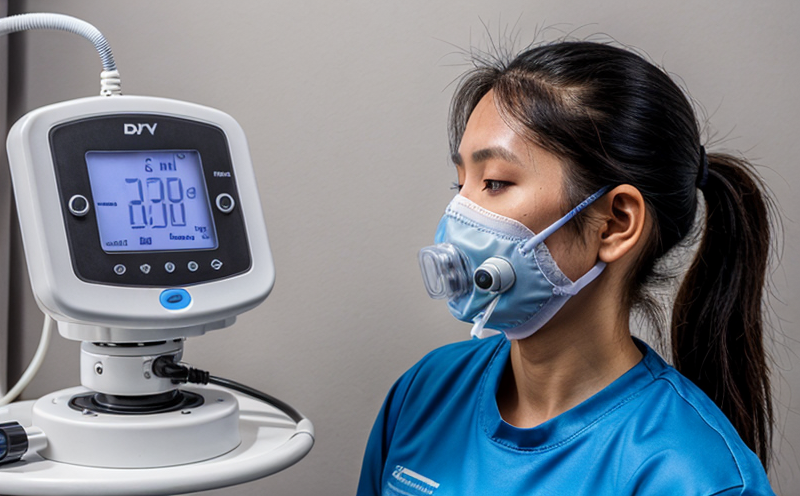ISO 5356-1 Conical Connector Fit Compatibility Testing
The ISO 5356-1 standard specifies the conical connector fit compatibility test, which is a critical procedure for ensuring that respiratory and ventilation devices can be connected safely and effectively. This test is essential in the medical device industry to guarantee that components from different manufacturers are compatible with one another, thereby enhancing patient safety.
The conical connectors used in respiratory and ventilation devices are designed to ensure secure connections between various parts of the equipment. These connectors must meet strict specifications to ensure they do not leak or allow airway obstruction during use. The ISO 5356-1 test involves inserting a male connector into a female connector to check for proper fit, tightness, and sealing.
The testing process begins with thorough preparation of the conical connectors. This includes cleaning the connectors according to the manufacturer’s guidelines to remove any contaminants that could affect the outcome of the test. The connectors are then placed in a suitable environment where they can be subjected to the test without external interference.
During the test, the male connector is inserted into the female connector at a specified angle and force. The force applied during insertion must be consistent with the maximum force recommended by the manufacturer. The insertion process is carefully monitored to ensure that it meets the required specifications for tightness and sealing.
The degree of fit between the connectors is crucial, as even slight misalignment can lead to leaks or improper function. After insertion, the connectors are checked for any signs of leakage or poor connection. If there is no leakage and the connector fits securely, it passes the test. Otherwise, further adjustments may be necessary.
The results of this test are critical in ensuring that respiratory and ventilation devices can perform their intended functions safely and effectively. By conducting this test, manufacturers and quality assurance teams can identify potential issues early on, preventing costly recalls or product failures later in the lifecycle.
It is important to note that compliance with ISO 5356-1 does not guarantee the safety of a medical device; it ensures only that the connectors fit properly. Other factors such as material compatibility and overall system design must also be considered for complete assurance of safety and efficacy.
The test procedure described in ISO 5356-1 is essential for respiratory and ventilation devices, including ventilators, oxygen delivery systems, and anesthesia machines. By ensuring proper connector fit, this test helps to prevent potential hazards associated with improper connections that could lead to life-threatening situations.
Benefits
- Enhanced Patient Safety: Proper conical connector fit ensures secure and leak-free connections, reducing the risk of harm to patients.
- Improved Device Compatibility: Ensures that components from different manufacturers can be used interchangeably without compromising performance or safety.
- Avoidance of Recalls: By identifying potential issues early in the development process, this test helps prevent costly product recalls and associated liabilities.
- Regulatory Compliance: Adherence to international standards like ISO 5356-1 demonstrates commitment to quality and reliability, which is essential for regulatory approval.
Why Choose This Test
The conical connector fit compatibility test is a vital component of the medical device testing process. Its importance cannot be overstated in ensuring that respiratory and ventilation devices function as intended without compromising patient safety.
Firstly, this test helps to identify any issues with the design or manufacturing process before products reach the market. By catching problems early on, manufacturers can make necessary adjustments to improve product quality and reliability.
Secondly, it ensures that all components of a respiratory or ventilation device are compatible with one another. This compatibility is essential for seamless operation and reduces the risk of equipment malfunction during use.
In addition, compliance with ISO 5356-1 standards can provide significant competitive advantages in the medical device industry. It demonstrates a commitment to quality and reliability, which can enhance brand reputation and customer trust.
The test also plays a crucial role in ensuring that devices meet regulatory requirements. Many countries require adherence to international standards as part of their certification processes. By meeting these standards, manufacturers can ensure smooth compliance with local regulations.
Finally, the conical connector fit compatibility test is a cost-effective way to prevent potential issues from becoming major problems later on. Early identification and resolution of design flaws or manufacturing defects can save time and money in the long run.
Quality and Reliability Assurance
The ISO 5356-1 conical connector fit compatibility test is an integral part of a comprehensive quality assurance program. This test helps ensure that respiratory and ventilation devices are reliable and safe for use in clinical settings.
One of the key aspects of this test is its ability to identify potential issues early on in the development process. By catching defects at this stage, manufacturers can make necessary adjustments to improve product quality and reliability before products reach the market. This proactive approach not only enhances patient safety but also reduces the risk of costly recalls.
Another important benefit of this test is its role in ensuring that all components of a respiratory or ventilation device are compatible with one another. Proper connector fit is crucial for seamless operation, reducing the likelihood of equipment malfunction during use. This compatibility ensures that devices work together harmoniously, providing consistent and reliable performance.
The conical connector fit compatibility test also plays a vital role in ensuring regulatory compliance. Many countries require adherence to international standards as part of their certification processes. By meeting these standards, manufacturers can ensure smooth compliance with local regulations. This compliance is essential for gaining market access and maintaining good standing within the industry.
Furthermore, this test contributes significantly to enhancing brand reputation and customer trust. Demonstrating a commitment to quality and reliability through adherence to international standards like ISO 5356-1 can enhance brand reputation and build strong relationships with customers.





